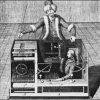[Edgar Allen] Poe states the difference between Babbage’s machine and a thinking machine. First up, his paragraph on Babbage’s engine, rearranged for easier consumption:
- (1) “Arithmetical or algebraical calculations are, from their very nature, fixed and determinate.
- (2) Certain data being given, certain results necessarily and inevitably follow.
- (3) These results have dependence upon nothing, and are influenced by nothing but the data originally given.
- (4) And the question to be solved proceeds, or should proceed, to its final determination, by a succession of unerring steps liable to no change, and subject to no modification.”
The thinking machine (chess-player) occurs later in the same paragraph:
- (1) “But from the first move in the game of chess no especial second move follows of necessity. In the algebraical question, as it proceeds towards solution, the certainty of its operations remains altogether unimpaired. The second step having been a consequence of the data, the third step is equally a consequence of the second, the fourth of the third, the fifth of the fourth, and so on, and not possibly otherwise, to the end.
- (2) But in proportion to the progress made in a game of chess, is the uncertainty of each ensuing move. A few moves having been made, no step is certain.
- (3) Different spectators of the game would advise different moves. All is then dependent upon the variable judgment of the players.
- (4) Now even granting (what should not be granted) that the movements of the Automaton Chess-Player were in themselves determinate, they would be necessarily interrupted and disarranged by the indeterminate will of his antagonist.
- (5) There is then no analogy whatever between the operations of the Chess-Player, and those of the calculating machine of Mr. Babbage…”
[The (link to the) full quote is below as well as the link for the entire piece.] This is an interesting and fundamental understanding of the differences between a calculating device and a computer capable of iterative deduction. I think also that both he and Lady Lovelace thought of the Babbage machine in terms of an added, extra intelligence for the human brain. After dealing with the machine’s history, and after looking at other explanations on how the thing could work, Poe delivers his conclusion: that the machine wasn’t a machine after all, and that it could not function in this way unless it was being guided by a human inside the machine, which in fact, of course, it was.
(via Ptak Science Books: A Note on Poe, Babbage and Thinking Machines, 1836)
